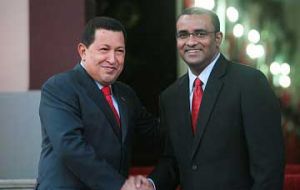MercoPress. South Atlantic News Agency
Venezuelan opposition plays the nationalist card in territory dispute with Guyana
 Chavez and Guyanese President Bharrat Jagdeo have a good relation
Chavez and Guyanese President Bharrat Jagdeo have a good relation Venezuela's opposition accused the government on Wednesday of turning a blind eye to neighbouring Guyana's oil exploration in a border region claimed by Venezuela, potentially inflaming a territorial dispute that dates back more than a century.
The conflict was stirred up in recent days by local media reports that Exxon Mobil Corp, in partnership with Royal Dutch Shell, is exploring for crude off the coast of the disputed Essequibo region.
The two South American neighbours squabbled over the area, which is the size of the US State of Georgia, for much of the 20th century. Venezuela calls it a “reclamation zone,” but in practice it functions as Guyanese territory.
”(We) firmly reject the concessions granted by the Guyana government in Venezuela's Atlantic waters,“ the opposition's Democratic Unity coalition said in a statement, slamming the government's stance as ”weak“.
”In the face of the activation of the concessions in the area, the government of President Hugo Chavez should address the issue immediately.“
An Exxon spokesman said in an email it and Shell ”have had an active exploration license offshore Guyana for several years, and we have obtained multiple seismic data sets in the area.”
Oil companies have shown growing interest in the north-eastern shoulder of South America, with industry experts describing a recent discovery off nearby French Guyana as a game-changer for the region's energy prospects. Local media reported that Guyana halted exploration of the offshore block called Stabroek in 2000 following a protest by Venezuela.
The dispute over the region known as the Essequibo resurfaced last year when Guyana asked the United Nations to extend its continental shelf - the area where countries control ocean resources - toward a region where Venezuela has granted natural gas concessions.
The much smaller and poorer Guyana still relies on imports for its energy needs and has invited companies including Spain's Repsol to drill for oil in other offshore areas not affected by the dispute.
The Essequibo, an area of rolling savannah and isolated jungle, shows little sign of Venezuelan presence. Many Guyanese see it as a crucial to their economic future due to its reserves of minerals including gold, diamonds and bauxite.
Chavez has taken a conciliatory stance in the dispute, striking up a friendship with former Guyanese President Bharrat Jagdeo and selling fuel to Guyana on advantageous terms under the Petrocaribe energy initiative.




Top Comments
Disclaimer & comment rules-

-

-

Read all commentsGreat another border dispute that dates back to the 19th century, instead of focusing how they would improve life for Venezuelans they focus on this.
Jun 07th, 2012 - 06:43 am 0South Americans generally speak spanish, and like most spanish speakers they seem to spend all their time worrying about border disputes rather than rooting out corruption, making their economies work and delivering societies that people want to actually live in.
Jun 07th, 2012 - 08:32 am 0It's got to do with the core cultural values of spanophone countries whereby they're just utterly incapable of delivering any kind of social justice, and they're all just pleonexiacs trying to be communists.
It's just retarded.
So thats:-
Jun 07th, 2012 - 08:45 am 0Argentina claiming the Falklands & other British Antarctic Territories,
Guatemala claiming Belize,
Spain claiming Gibraltar,
Venezuela claiming (only part of!) Guyana
What is it with these Hispanic countries? And ALL of them in shit-state.
Spend your energy in fixing your own broken countries, tossers.
Do they claim the moon as well? Wouldn't surprise me. lol
Commenting for this story is now closed.
If you have a Facebook account, become a fan and comment on our Facebook Page!